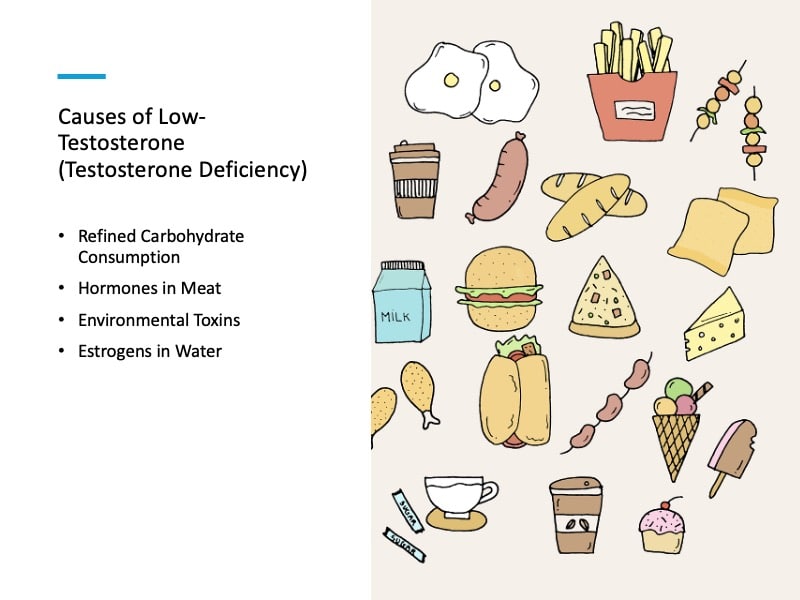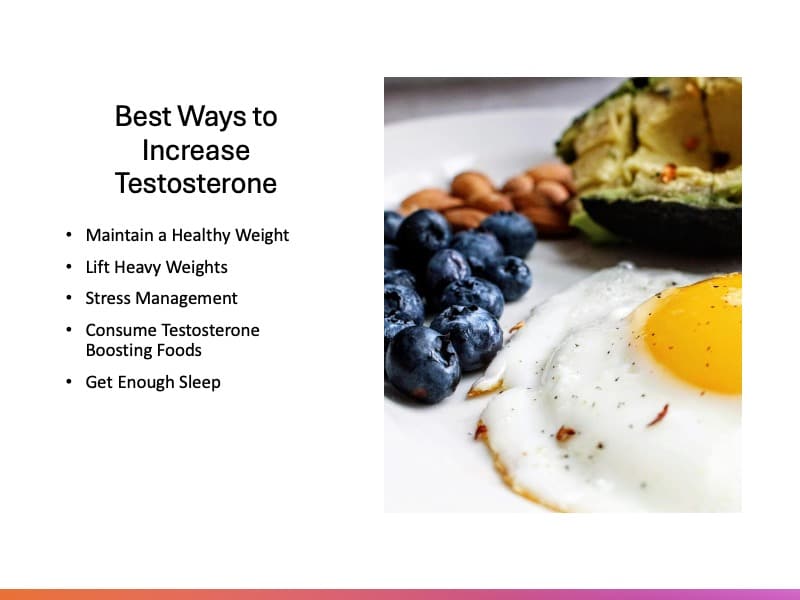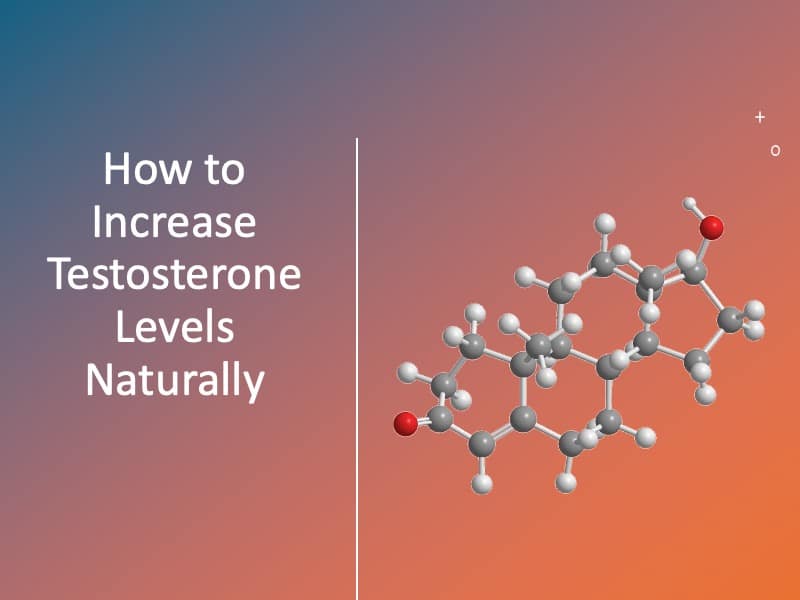Although most people have a vague understanding of testosterone, very few fully appreciate this hormone’s importance. Testosterone is a vital hormone for both men and women.
Not only does testosterone play an important role in helping people build muscle, as most people commonly know, but it plays a crucial role in several aspects of general health for both men and women.
However, numerous men and women have problems with low testosterone. According to the Cleveland Clinic, almost 40% of men over the age of 45 have low testosterone, but this health issue also affects men and women of other age ranges.
Unfortunately, low testosterone is steadily growing in our modern era as people are less physically active and eat worse diets than ever before.
This article will describe some of the signs and symptoms of low testosterone that men and women should be aware of and a few healthy ways to increase testosterone levels naturally!
Why Is Testosterone Important?
Testosterone is the primary sex hormone for men and a crucial hormone for women. In men, testosterone plays a key role in developing male reproductive organs and additional characteristics such as increased muscle and bone mass and the growth of body hair.
For women, some of the primary functions of testosterone include producing new blood cells, enhancing libido, influencing additional hormones that can affect reproduction, and supporting healthy muscle mass and bone health.
In general, testosterone regulates many functions inside the human body, such as:
- Fat Distribution
- Muscle Mass
- Production of Red Blood Cells
- Fertility
- Strength
- Mood
- Bone Density
Testosterone levels can even be associated with mortality (death) itself. According to a study in The Journal of Clinical Endocrinology & Metabolism,
“In an observational cohort of men with low testosterone levels, testosterone treatment was associated with decreased mortality compared with no testosterone treatment.”
Although low testosterone can affect a wide range of men and women, older men are the age group most prone to experiencing the symptoms of low testosterone.
Testosterone levels peak when you are in your 20s, and then after your 30s they begin to decline. Generally, testosterone levels will gradually decline by about .4-2% every year after you reach 30 years old.
Decreasing testosterone levels is natural, yet you can slow down the reduction of testosterone, improving your overall health.
Having low testosterone levels can cause rampant issues within the body, so it is important to know how to notice when you have decreasing testosterone levels and how to increase your testosterone levels naturally!
Causes of Low-Testosterone (Testosterone Deficiency)

Many factors contribute to testosterone deficiency, including:
- Poor Eating Habits
- Smoking
- Lack of Physical Exercise
- Not Taking Proper Vitamins and Minerals
- Eating Processed Foods
- Drinking Sugar-Sweetened Beverages
Refined Carbohydrate Consumption
Much of the food consumed in a typical Western diet is processed carbohydrates. For example, having milk with a bowl of cereal
Elevated insulin is the initial cause of diabetes. It disturbs the main hormone pathway in the human body and later extinguishes testosterone production (Hut et al., 2018).
Hormones in Meat
In the United States, exogenous hormone treatment is used to assist the growth of animals raised for meat production. However, these exogenous hormones can affect testosterone levels when consumed in higher amounts (Kolok et al., 2018).
You don’t necessarily need to avoid the consumption of meat because meat contains many beneficial vitamins, minerals, fats, and amino acids that assist testosterone production, but you should opt for grass-fed and hormone-free meat when possible.
Environmental Toxins
There are a variety of environmental toxins that can disrupt testosterone production (Krzastek et al., 2020).
Regular exposure to these endocrine-disrupting materials such as phthalates and BPA can cause a reduction in testosterone levels at all ages.
One of the best ways to avoid such circumstances is to switch to organic food and cosmetic products.
Of course, it is impossible to avoid all environmental toxins, but you can reduce your exposure as much as possible.
Estrogens in Water
There are a variety of pathways through that estrogen hormones can end up in water supplies, and this contamination of water supplies with estrogen can affect testosterone levels negatively (Gonsioroski et al., 2020).
Common Symptoms of Low Testosterone in Men
Testosterone deficiency or “low T” can manifest in various ways, from fatigue and low libido to mood swings and reduced muscle mass. Symptoms often depend on age but can generally include:
- Low Energy and Persistent Fatigue
- Irritability and Depression
- Decreased Muscle Mass and Increased Body Fat
- Low Libido and Erectile Dysfunction
- Poor Sleep Quality and Concentration Difficulties
Older men and women are more prone to these symptoms, although low testosterone can impact adults of all ages.
How to Increase Testosterone Naturally

Regardless of whether you are a man or woman, it is important to have normal and stable testosterone levels. If you suffer from low testosterone, these tips can help you with increasing your testosterone levels naturally:
Maintain a Healthy Weight
If you are underweight, overweight, or obese, the first step you should take to increase your testosterone levels is to achieve and maintain a healthy weight.
Although being underweight can also contribute to testosterone issues, being overweight or obese is more common and affects more men and women.
Being overweight or obese is attributed to many health problems, and low testosterone is one of those issues because obesity leads to the overproduction of estrogen, which leads to reduced production of testosterone, thus causing a hormonal imbalance.
There are also other ways that maintaining a healthy weight will improve your testosterone levels. Maintaining a healthy weight likely requires the consumption of nutrient-dense testosterone-boosting foods and exercising, which will increase your testosterone.
Lift Heavy Weights
Resistance training, especially compound exercises like squats and deadlifts, boosts testosterone levels more effectively than other forms of exercise (Sports Medicine).
Weight lifting also supports muscle growth, which further promotes testosterone production.
Stress Management
Stress can contribute to various health issues, and it certainly can interfere with your ability to synthesize testosterone.
There are many natural remedies for stress which are effective for helping you learn how to reduce stress on your own.
Daily meditation, prayer, deep breathing, a contrast shower, and practicing yoga are excellent ways to reduce stress.
If you are interested in trying yoga but have never practiced it before I suggest trying the online yoga videos at YogaDownload.com or try the 21-day Yoga Shred Program.
Consume Testosterone Boosting Foods
Certain foods can naturally enhance testosterone production:
- Oats and Whole Grains: Complex carbohydrates like oats and whole grains provide essential nutrients and help reduce cortisol, aiding in stress management.
- Healthy Fats: Avocado, nuts, olive oil, and fatty fish support hormone synthesis.
- Eggs: Rich in protein, Vitamin D, and healthy fats, eggs are very beneficial for testosterone levels.
Get Enough Sleep
Getting enough sleep is vital for maintaining a healthy testosterone level, and many studies have shown that sleep increases or stabilizes testosterone.
Sufficient and quality sleep is critical for testosterone production. Studies indicate that testosterone levels naturally increase during sleep, with even minor sleep restrictions reducing testosterone significantly.
Taking a melatonin supplement and zinc before bed can help to improve your sleep quality and testosterone levels.


Leave a Reply